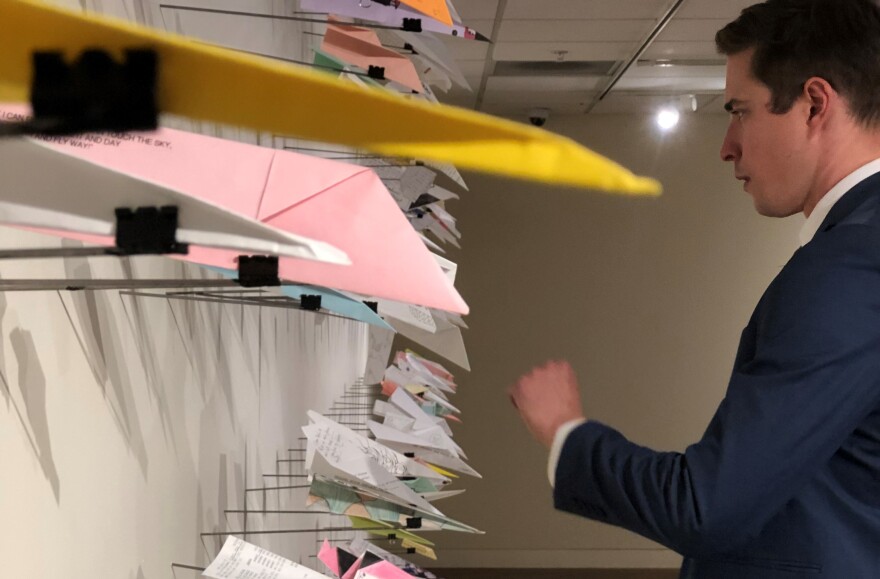Benjamin Todd Wills seems to understand that community is all-inculsive. That is, a community is not just made up of law-abiding families and hard-working citizens, it's also composed of those who've made grave errors and are paying the price.
For years, Wills, an art professor at Washburn University in Topeka, Kansas, has corresponded with inmates. After he mentioned to one man that he's a sculptor, the man sent a paper airplane with a note that read: “As far as a sculpture goes, this is the best that I can do.”
"I thought it was such a nice object stand-in for that person, that I started asking at the end of my letters to everyone, ‘If you have a moment, I would love to receive an airplane from you,'" Wills told Central Standard host Gina Kaufmann.
If you tell two people to make a paper airplane, the results will be pretty different. So different, Wills says, that planes can be stand-ins for individuals. And as a symbol of freedom, the airplane is an especially poignant representation of a person if that person is a prisoner.

To date, he's received around 500 planes, each as different as its creator.
"Sometimes it's very apparent that an inmate has come up with some creative way to get paper or to add color to them," he said. "Some of them have homemade ketchup-turns-into red-kind-of paint on them."
Wills began what is now a letter-writing campaign about five years ago. He had two friends in prison. They eventually asked Wills if he'd be willing to write to others who never receive mail.
He said it quickly became apparent that incarcerated people need some sort of connection to the outside world.
"There's a lot of repeated phrases, like ‘This is the first time somebody has written to me since the beginning of my incarceration.' Or: 'This is the first time my name was called during mail call.' Somebody wrote this week that it was the first letter they received in 11 and a half years," Wills told Kaufmann.

According to the Prison Policy Initiative, the United States locks up more people than any other nation. As of 2018, there were 2.3 million people confined in local, state, federal or juvenile facilities. With 693 people locked up for every 100,000 residents, that's a higher rate than any other country.
Wills said he feels a social responsibility to try to help his community. He thinks reaching out to incarcerated people isn't happening enough in the United States.
"We have a focus on punishment instead of rehabilitation. We have for-profit prisons, we have companies that make a lot of money with incarcerated people. If you look at a program like ours, as opposed to something like a program in Norway, we have a recidivism rate of about 76 percent, where they have a recidivism rate of about 20 percent," Wills said.
He said he has read that in other countries, correctional systems allow inmates to hang onto their personal identities more than in the United States. Also unlike in the United States, corrections in some other nations includes elements of community outreach, medical intervention and education.
Each plane is significant as a stand-alone object, Wills said, but their message is stronger when they're viewed as a collection as they are now at the Kansas City Public Library.
"I really have started talking about the project more like a choir," Wills said. "Each one of them is sort of a soloist at one time, but if you step back, the message that they send together is very overwhelming and a really beautiful kind of mix of shapes and colors and shadows."

He wants the prisoners to know that their planes are seen on the outside. Each time Wills displays the planes, he creates a postcard image to send to the prisoners.
"Not only do they send their airplane to me, but they get proof of it being in Atlanta or being in Philadelphia or being in Kansas City. There’s something that they made that gets to contribute to a larger project that’s moving all over the country constantly," Wills said.
"Airplanes," through March 31 in the Guldner Gallery at the Kansas City Public Library, 14 West 10th Street, Kansas City, Missouri, 64105.
Follow KCUR contributor Anne Kniggendorf on Twitter, @annekniggendorf.
Listen to Gina Kaufmann's full conversation with Benjamin Todd Wills here.







